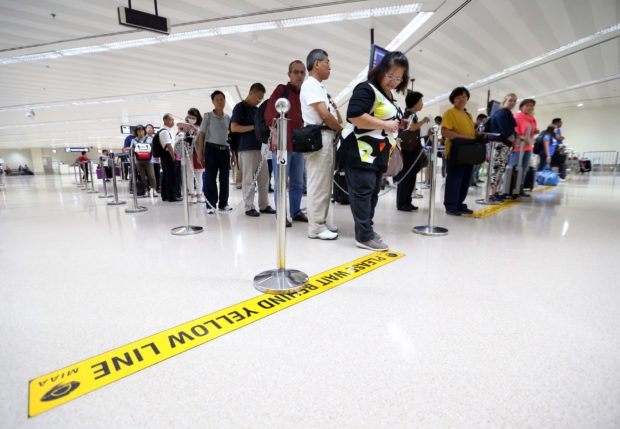
Passengers at the NAIA Terminal 1 line up for immigration screening. The Bureau of Immigration said that the screening process usually takes only 45 seconds per passenger. INQUIRER PHOTO/LYN RILLON
MANILA, Philippines – If a passenger does not have any issues, the immigration screening processes should only take around 45 seconds, the Bureau of Immigration (BI) said Tuesday.
BI Port Operations Division Chief Grifton Medina said that immigration officers in airports nationwide can accommodate up to 700 passengers in two to three hours.
“Ang average ng isang immigration officer in a span of two hours or three hours, unless may volume, ay nasa 400 to 500 to 700 passengers. So mabilis po ang ating mga immigration officers (An immigration officer can accommodate 400 to 700 passengers in two to three hours unless there is high volume of passengers. So our immigration officers are really fast),” Medina said in an interview over AM radio station DZMM.
Medina said that this is in line with the standards set by the International Civil Aviation Organization (ICAO).
He explained that immigration screening process only exceeds 45 seconds when the immigration officer needs to conduct a secondary inspection, especially when a traveler presents questionable documents.
Medina added that the electronic gates installed for arriving passengers also helped expedite the screening processes in the country.
Less immigration officers
Medina said, however, said that there are fewer immigration officers in airports after around 300 officers resigned.
Medina said that the resigned officers are already seasoned and skilled, making it hard for BI to replace them.
Asked if immigration officers are trained not to smile at passengers, Medina said: “Palagay ko po ay ngingiti na sila kasi napirmahan na ang General Appropriations Act so magkakaroon na rin kami ng augmentation pay kasi matagal na rin pong hindi nakakatanggap (I think they will smile more now that the General Appropriations Act has been signed. They will finally receive their augmentation pay after a long time).” /gsg